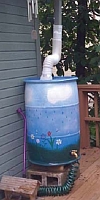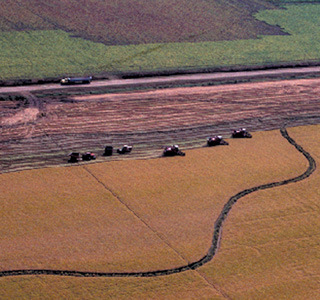Contact
Professor of Environmental Quality and Nutrient Mgt
Phone: 501-671-2281
Fax: 501-671-2297
Email: mdaniels@uada.edu
University of Arkansas System Division of Agriculture
Cooperative Extension Service
2301 S. University Avenue
Little Rock, AR 72204
Water Sustainability in Arkansas
Sustainability creates and maintains the conditions under which humans and nature can exist in productive harmony, that permit fulfilling the social, economic and other requirements of present and future generations.
The "three pillars" theory (or "Triple Bottom Line") of sustainability accounts for social, environmental, and economic demands, balancing the importance of People, the Planet and Profit.
Featured Webinars
Low Impact Development for Water Quality and Conservation in Our Communities.
Better understand the benefits of using low impact development in our communities and how it can help prevent common stormwater problems associated with the mid 20th century approach to stormwater management.
Sustainable Solutions to Stormwater Management: Green Infrastructure Design, Construction, and Maintenance
Farm and Ranch Water Sustainability
| PUB | Title |
| FSA-1012 | Drainage for Wheat Production drainage methods pertaining to wheat crops, including surface smoothing, drain furrows, precision grading, and ditches. |
| MP192 | Arkansas Rice Production Handbook - Chapter 9: Water Management water needs, pump flow and cost, various types of irrigation and water delivery, and a list of critical water management situations. |
| MP197 | Arkansas Soybean Production Handbook - Chapter 6: Drainage drainage and tillage. |
| Irrigation Efficiency | Arkansas Soybean Podcast with Mike Daniels, Professor, Extension Water Quality and Nutrient Management |
|
| Soybean Irrigation Information | Arkansas Soybean Podcast with Mike Daniels, Professor, Extension Water Quality and Nutrient Management |
|
| Tailwater Recovery System Advantages | Arkansas Soybean Podcast with Mike Daniels, Professor, Extension Water Quality and Nutrient Management |
| PUB | Title |
|---|---|
| FSA-5026 | Riparian Buffers: Functions and Values definition and functions of riparian buffers, including buffering and filtering, ecosystem services, wildlife habitat, and how riparian buffers can increase property value. |
| FSA-5027 | Riparian Buffers: Types and Establishment Methods types of riparian buffers, including grass, three-zone and two-zone forest, wildlife, urban, and naturalized, as well as how to establish a riparian buffer. |
| FSA-9098 | Best Management Practices for Waterbirds on Agricultural Lands general waterbird information and descriptions of related BMPs such as nutrient management, conservation buffers, and many more. |
| MP483 | Wildlife Habitat Management for Arkansas Landowners |
| MP499 | A Riparian Area Assessment Guide for Streamside Landowners definitions and information on Stream*A*Syst and Stream*A*Syst Action Plans, as well as goals of streambank and riparian area management. |

The United States Department of Agriculture (USDA) Natural Resources and Conservation Service (NRCS), has provided funding for the University of Arkansas System Division of Agriculture, to integrate the efforts of the Arkansas Discovery Farms and the Arkansas Soil Health Alliance. Our goal is to educate a statewide network of participants through a series of no-cost virtual research-based, interactive demonstrations and educational experiences.
This series of Soil & Water Conservation Virtual Field Trips (VFTs), focuses on the conservation benefits our researchers have developed with respect to water quality, irrigation water use, climate change, soil health, profitability and sustainability through their partnership with farmers on selected farms including some farmers involved in the Arkansas Discovery Farms Program.
At no cost to high school science teachers, lesson guides that meet the Arkansas Department of Education's Next Generation Science Standards (NGSS) framework are created and made available for this series.
Check out our Virtual Field Trip page to access free lesson guides and register for upcoming VFTs.
Home & Garden
| PUB | Title |
|---|---|
| FSA-9520 | Home Water Conservation numerous household tips to conserve home water use both indoors and outdoors, as well as a list of drought-resistant landscape plants. |
| FSFCS01 | Keep Food and Water Safe During Power Outages and Floods food and water safety before and after floods and power outages. |
| FSFCS21 | Safe Medicine Disposal in Arkansas |
| MP292 | Improving Home Water Quality home water testing, common home water quality issues and treatments. |
| Pet Waste Management to Protect Water Quality with John Pennington, Washington County Extension Agent |
 A rain barrel on your property can be a fun and rewarding opportunity!
A rain barrel on your property can be a fun and rewarding opportunity!
Rain barrels are storage containers placed in areas where runoff flows from impervious surfaces during a rainfall event, such as a roof gutter outflow point.
The stored water in the rain barrel can then serve specific purposes. For example, you can use rain barrel water to irrigate your home garden and flower beds or wash your car..
Rain barrels can be purchased relatively inexpensively (less than $100) from home improvement stores, or you can even construct your own.
Learn how to build a rain barrel.
| PUB | Title |
|---|---|
| FSA-9534 | Building Rain Barrels to Harvest Rainwater (color) |
| How to Build a Rain Barrel to Protect Water Quality with John Pennington, Washington County Extension Agent |
|
| Using Rain Barrels to Protect Water Quality with John Pennington, Washington County Extension Agent |
| PUB | Title |
|---|---|
| FSA-9532 | Understanding Nutrient Management Laws for Turf Grass, Lawn Care and Landscaping (color) |
| Smart Landscape Irrigation - Sprinkler Evaporation with Mark Brown, Pulaski County Extension Agent |
|
| Smart Landscape Irrigation - Sprinkler Maintenance with Mark Brown, Pulaski County Extension Agent |
|
| Irrigation Technology Presentation with Mark Brown, Pulaski County Extension Agent |
Stormwater
| PUB | Title |
|---|---|
| FSA-5029 | Forests and Urban Stormwater stormwater problems related to forest ecosystems and how trees can be incorporated into urban areas to improve stormwater management. |
| ETB259 | Assessment of Storm Water Runoff Issues in Pine Bluff, White Hall, the University
of Arkansas at Pine Bluff and Jefferson County survey of outdoor home water use and its effect on local water quality with results and overview of the EPA's Phase II Final Rule. |
| Stormwater Education webpage Water Quality | Environment and Nature | Arkansas Extension |
|
| Northwest Arkansas Stormwater Education Partnership between Cooperative Extension Service and city and county governments in Benton and Washington Counties to carry out education, outreach, participation, pollution prevention and good housekeeping. |
|
| Protecting Water Quality from Stormwater Runoff with John Pennington, Washington County Extension Agent |
|
|
Sustainable Solutions for Stormwater Mngmt: Green Infrastructure Design, Construction,
and Maintenance Webinar |
| PUB | Title |
|---|---|
| FSA-9533 | Rain Gardens and Stormwater what a rain garden is, what the environmental benefits are, how they are constructed, and a list of native Arkansas plants for rain gardens. |
| Rain Gardens webpage Water Conservation | Environment and Nature | Arkansas Extension |
|
| Harvest the Sky with Rain Gardens (by Katie Teague) general concept of rain gardens, what they are, how they work, and how they are built. |
|
| Plants for Rain Gardens (by Janet Carson) arrangement of plants in a rain garden and lists of native and non-native plant species suitable for rain gardens. |
|
| Rain Garden Maintenance (by Mark Brown) top ten maintenance needs of a rain garden. |
|
| How to Build a Rain Garden to Protect Water Quality with John Pennington, Washington County Extension Agent |
|
| Using Rain Gardens to Protect Water Quality with John Pennington, Washington County Extension Agent |
|
| Potential Rain Garden Native Plant Selections for Northwest Arkansas | |
| Rain Gardens...Capture the Flow and Watch it Grow definition and benefits of a rain garden and guide to creating your own. |
Conservation Resources
|
2021 Regional Conservation Partnership Program (RCPP)
As part of the enhancement project, landowners and agricultural producers in the Buffalo River Watershed are eligible to receive conservation assistance funding to implement conservation practices to help maintain and improve water quality. Additionally, watershed landowners are eligible for assistance from the project partners aimed at eradicating feral hog populations, preventing erosion and managing pastures and unpaved roads in the area. Learn more about this project and how it can help you! We are looking for landowners in the Buffalo Watershed. If you're interested in participating please fill out the form below. |
|
| ANRC Tax Credit Programs Available under the Water Resource Conservation and Development Incentives Act, available tax credits include impoundments, conversion, and leveling. |
 |
Arkansas Department of Environmental Quality (ADEQ) - Water Division ADEQ strives to protect and enhance the state's environment through regulatory programs, proactive programs and educational activities. |
| Arkansas State Plant Board (ASPB) The Plant Board regulates products and services such as seed, feed, fertilizer, pesticides, weights and measures, petroleum, honeybees, plant pests, nurseries and pest control services. |
|
| ArkansasWater.org Administered by AACD, this website compiles and shares water quality information and resources. |
|
| Sustainable Agriculture Research and Education (SARE) | USDA SARE grants and education program has advanced agricultural innovation that promotes profitability, stewardship of the land, air and water, and quality of life for farmers, ranchers and their communities. |
|
| United States Geological Survey (USGS) | Arkansas The USGS is a science organization that provides impartial information on the health of our ecosystems and environment, the natural hazards that threaten us, the natural resources we rely on, the impacts of climate and land-use change, and the core science systems that help us provide timely, relevant, and usable information. |
| UAEX Public Policy Center The Public Policy Center exists to provide Arkansans with timely, credible, unbiased and research-based information and education about public issues. Water-related issues include Arkansas Watersheds and Stormwater Education. |
|
| Arkansas Agricultural Experiment Station (AAES) - Division of Agriculture | University of Arkansas System AAES is the primary research support agency for Arkansas farmers and ranchers, food processors, related industries and consumers. Research topics include families, communities and natural resources associated with Arkansas agriculture. |
|
 |
Crop, Soil, and Environmental Sciences Dept - Bumpers College | University of Arkansas at Fayetteville |
| Arkansas Water Resources Center (AWRC) AWRC operates the Water Quality Laboratory located in Fayetteville, Arkansas. |
 Serving the south-central and southwest regions of Arkansas, the The Arkansas Conservation Partnership (ACP) is a unique force, combining the strengths of federal, state and local organizations
along with educational institutions, to help preserve and protect The Natural State.
Serving the south-central and southwest regions of Arkansas, the The Arkansas Conservation Partnership (ACP) is a unique force, combining the strengths of federal, state and local organizations
along with educational institutions, to help preserve and protect The Natural State.
The Partnership promotes a conservation ethic to enhance the ability of its members to serve rural and urban communities and strives to more effectively assist private landowners in meeting the conservation challenges of the 21st century.
The six most important natural resource issues the Partnership focuses on are:
- water resources
- land resource management
- conservation education and outreach
- forestry health
- Farm Bill implementation
- community development
Members of The Arkansas Conservation Partnership:
| Cooperative Extension Service - Water Sustainability Conservation research and education is coordinated by Dr. Mike Daniels, Professor of Environmental Quality and Nutrient Management on behalf of the University of Arkansas System, Division of Agriculture. |
|
| University of Arkansas at Pine Bluff With an emphasis on rural development, the School of Agriculture, Fisheries and Human Sciences (SAFHS) strives to help improve the quality of life for people in Arkansas, the nation, and the world. The Office of International Programs, within SAFHS, is vital to achieving global effectiveness and success. |
|
| |
Arkansas Association of Conservation Districts (AACD) Conservation districts are local governments at work and their specific responsibility is management of our soil and water resources. |
| Arkansas Association of Conservation District Employees (AACDE) AACDE is a district employee organization operated by the district employees with the support and approval of individual district boards. AACDE is affiliated with AACD and works with its partner agencies to promote conservation programs and agendas. |
|
| Arkansas Association of Resource Conservation and Development Councils, Inc. (RC&D) RC&D is a rural development effort of the USDA providing tools and technical support to stabilize and grow local communities while protecting and developing natural resources. There are 7 RC&D areas which cover the entire state of Arkansas. |
|
| Arkansas Forestry Commission (AFC) AFC works with agencies, organizations and residents to prevent and suppress wildfires, control forest insects and disease, grow and distribute trees, and gather and disseminate information concerning the growth, use and renewal of forests. |
|
| Arkansas Natural Resources Commission (ANRC) ANRC establishes policy and makes funding and regulatory decisions relative to soil conservation, nutrient management, water rights, dam safety and water resources planning and development. |
|
| Natural Resources Conservation Service (NRCS) - Arkansas | USDA NRCS is a conservation leader for all natural resources, ensuring private lands are conserved, restored, and more resilient to environmental challenges, like climate change. |
 The Buffalo River Watershed Enhancement Project, an RCPP project, seeks to collaborate
with private landowners to reduce erosion on their land and enhance water quality
in the Buffalo River.
The Buffalo River Watershed Enhancement Project, an RCPP project, seeks to collaborate
with private landowners to reduce erosion on their land and enhance water quality
in the Buffalo River.